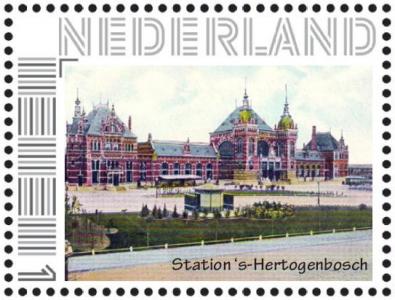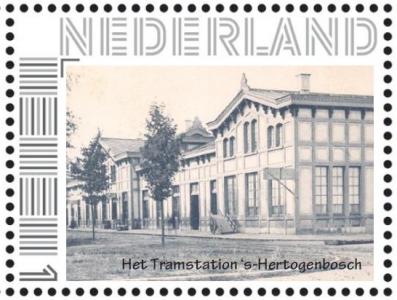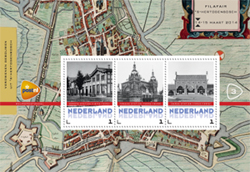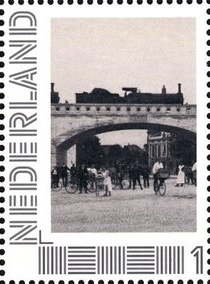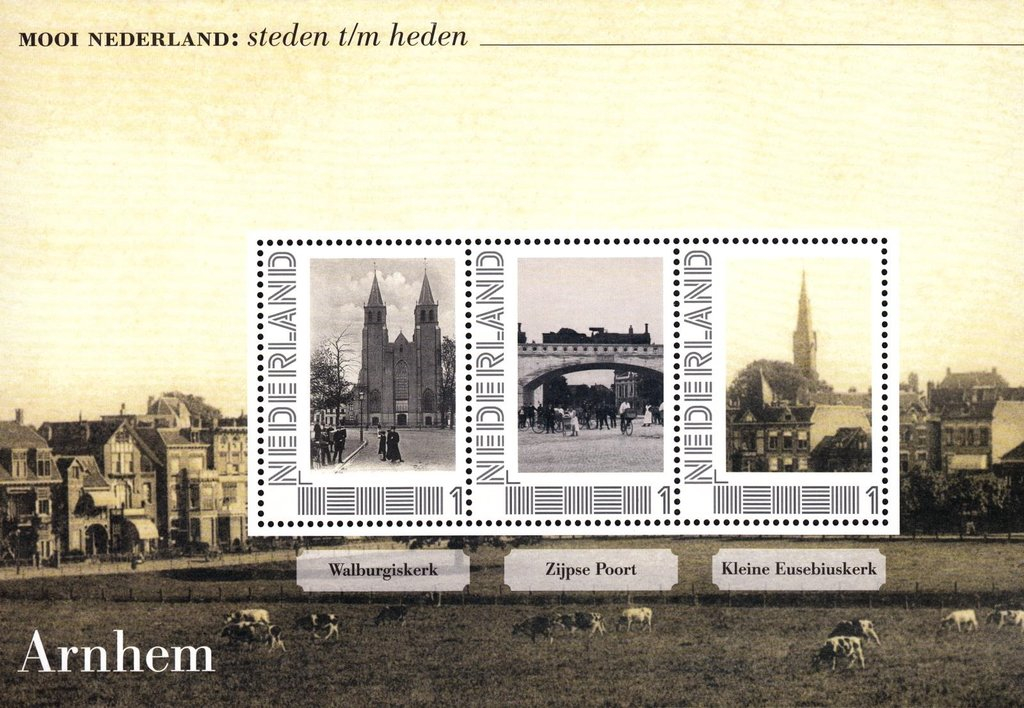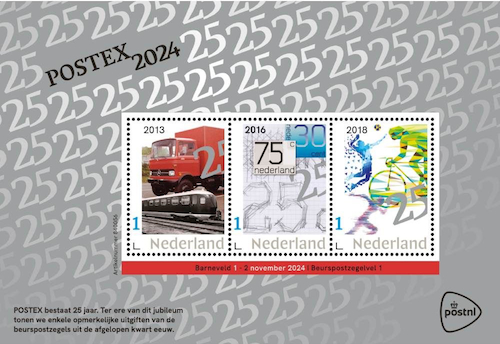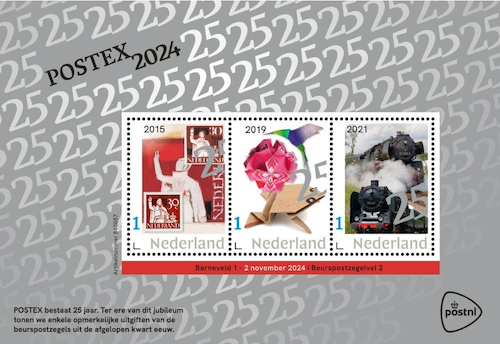2007: Frame stamps of the Dutch Postal Services (TNT)
Two stamps of 0,44 euros in commemoration of the opening of the first Dutch railway line: Amsterdam - Haarlem.
These stamps were issued in a set of 100 stamps: 2 stamps per historical event. The fifty historical events comprise the canon of
Dutch history. They were only available in sheets by subscription. Although they could be used as postage stamps, hardly anybody did so.
They were included in a special catalogue of Dutch personalized stamps.
Designer: Studio Dumbar
print: gravure, Joh. Enschedé
Glue:
Watermark: no
Value: 44 eurocents
Perforation: 13:13¼
Catalogue of personalized stamps from The Netherlands: 2489-A-57 and 2489-A-58
|
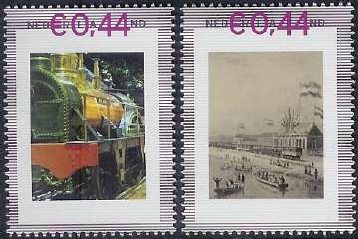

|
2010: Personalised stamps Antverpia Stamp Expo
This stamp of 0,44 euros shows Thalys alongside the platform at Antwerp Central Station. It was issued on occasion of the Antwerp
2010 international Stamp Exhibition "Antverpia" by TNT post, the Dutch postal services. The event was held in the Belgian city of
Antwerp from Friday April 9th till Monday April 12th in 2010.
Catalogue of personalized stamps from The Netherlands: 2563-C-8
|
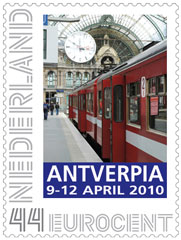

|
2011: Personalised stamp sheet of the series Cities up to the Present (Steden tot Heden): Goes.
By subscription one could get hold of this sheet about Goes. The third stamp on the sheet shows one of the passenger carriages of the Goes – Borsele line (SGB).
The railway operates a fleet of seventeen locomotives: nine diesel engines, six steam engines, and two relatively unusual 1,500 volt Alstom electric
engines. Additionally, three heritage diesel railcars are in service. The railway's headquarters are located at Goes. From here trains operate to
's-Gravenpolder, Nisse, Kwadendamme, Hoedekenskerke, and finally Baarland. When operating the service using vintage diesel railcars, trains call
at all six stations. However, on steam operating days, trains call only at the stations in Goes, Kwadendamme, and Hoedekenskerke. On intensive service
days the railway operates both steam trains and diesel railcar trains, but with the same rules about stations.
Catalogue of personalized stamps from The Netherlands: 2751-Ad-4
|
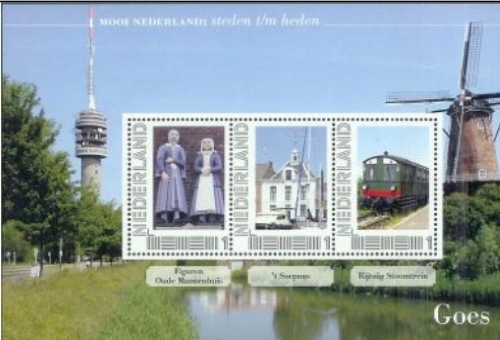

|
2013 (1): Personalised stamps of Postex stamp fair
Postex 2013 issued three commemoration sheets, one of which is about mail transportation by rail.
Catalogue of personalized stamps from The Netherlands: 3012-C-11
|
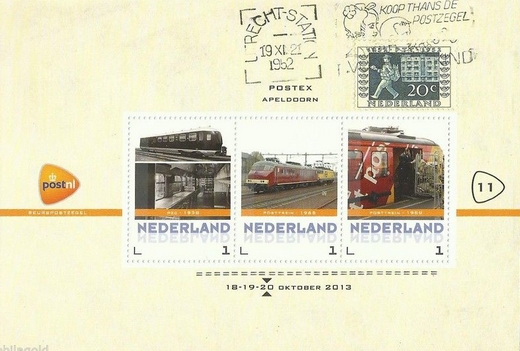

|
2013 (2): Personalised stamp with a print by Anton Pieck
Anton Pieck was a Dutch draftsman and painter who was famous for the way he depicted 18th and 19th century life.
In 2012 The Dutch postal services started the issue of 25 sheets with paintings and drawings by this well-known artist by subscription.
Each sheet contained 10 stamps with the same image. The last of the set of 25 was called: Anton Pieck musea (museums).
In the pictured museum is a replica of the first Dutch locomotive, Arend, to be seen.
Catalogue of personalized stamps from The Netherlands: 2751-Af-25
|
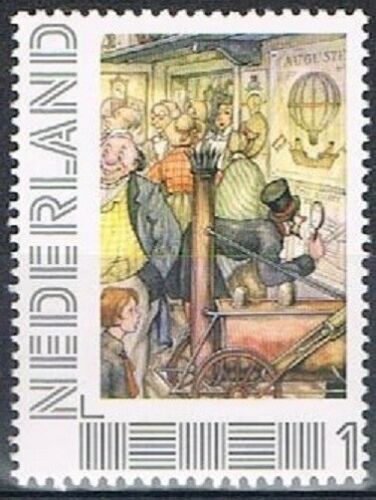

|
27-05-2013 (3): Personalised stamps with Rotterdam Erasmus Bridge
This stamp comes from a sheet of personalized stamps in the series "I love The Netherlands" (Ik hou van Nederland),
which could be obtained by subscription from Collect Club. The other sheets were about the Dutch provinces,
but there were four extra sheets in the subscription. One of which was the sheet about Dutch cities. There were three city stamps:
The Hague, Utrecht and Rotterdam. The Rotterdam stamp shows Erasmus Bridge which is also used for tram traffic.
No entry in official catalogue as yet.
|


|
2014 (2): Paparazzo stamp sheet, 22nd August 2014
Paparazzo is a monthly issue of personalised stamps starring comic character Paparazzo, a creation by comic writers and drawers
Pieter Hogenbirk and Herman Roozen.
The first sheet was issued on 30th April 2013. The sheet about the celebration of 175 years of Dutch Railways was numbber 10 of 2014.
Designers: Pieter Hogenbirk and Herman Roozen
print:
Glue:
Watermark: no
Value: 1
Perforation:
Article number: 740017
Catalogue of personalized stamps from The Netherlands: 3012-Aa-19
|
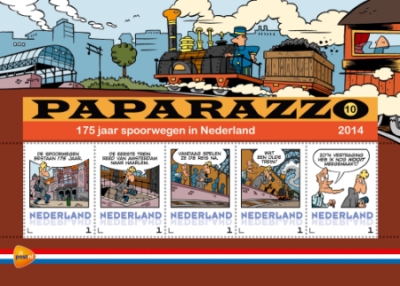

|
2015: Rotterdam Erasmus Bridge
On the occasion of the start of the Tour de France in Utrecht in 2015, PostNL issued a sheet on the 4th of July. On the second day the cyclists passed
Erasmus Bridge at Rotterdam. This bridge has tramrails. Tram number 20 uses them to get from Rotterdam Central Railway Station to the IJsselmonde quarter.
The stamp in the centre of the sheet shows Erasmus Bridge.
Catalogue of personalized stamps from The Netherlands: 3012-D-66
|
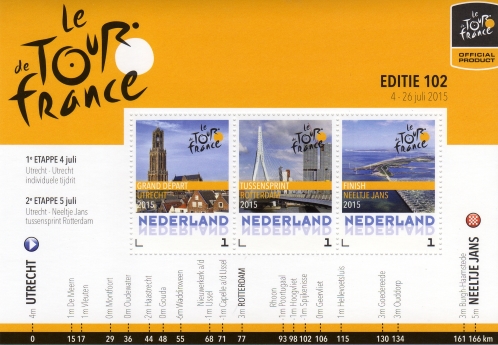

|
2016 (1): Personalised stamp sheet of the series Cities up to the Present (Steden tot Heden): Roosendaal - rail yard
By subscription one could get hold of this sheet about Roosendaal. This city serves as a regional railway hub. The international trains from Amsterdam
to Brussels call at Roosendaal, as does the Amsterdam-Vlissingen (Flushing) intercity. There is also a stop-train service to Antwerp.
Catalogue of personalized stamps from The Netherlands: 2751-Ad-53
|
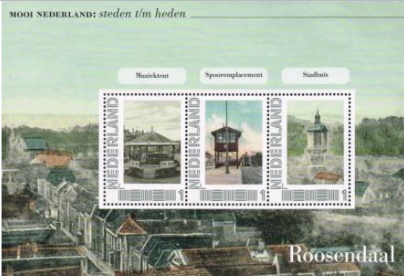

|
2016 (3): Personalised stamp sheet of the series Cities up to the Present (Steden tot Heden): Arnhem - Railway Station
By subscription one could get hold of this sheet about Arnhem. The stamp on the left shows the Arnhem railway station.
The station is an important junction in the eastern Netherlands and in rail traffic with Düsseldorf (Germany), Utrecht, Zwolle, Nijmegen, Tiel and the Achterhoek. Moreover, it is a transfer hub for city and regional transport in the center of Gelderland. The current station building is the fourth station on that site. This building, designed by Ben van Berkel, was completed in 2015. In 2016, Arnhem Centraal was the 14th largest station in the Netherlands in terms of passenger numbers, with around 40,000 passengers boarding and alighting from NS trains per day (not including passengers from other rail operators).
Catalogue of personalized stamps from The Netherlands: 2751-Ad-59
|
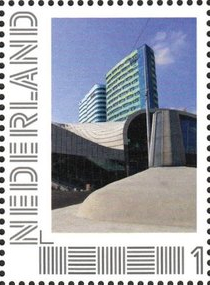
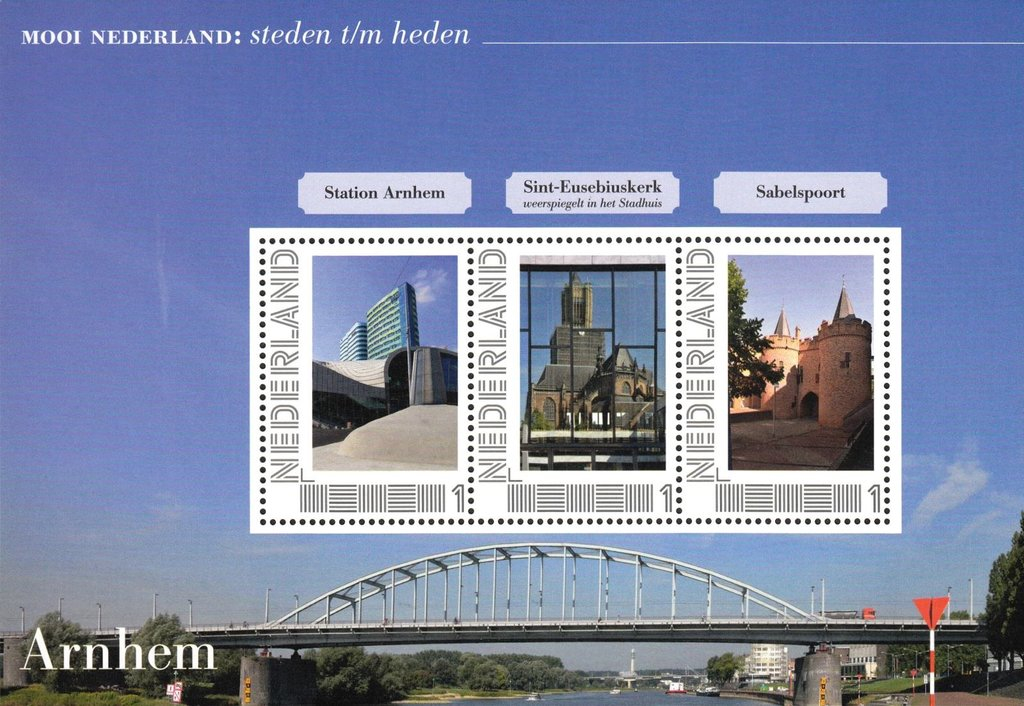

|
2019: Personalised stamps Flevorailway, personalised stamp sheet from the series Treinen & trajecten (Trains & Tracks)
The Weesp–Lelystad railway, also known as Flevolijn, is a railway in the Netherlands operated by Nederlandse Spoorwegen and owned by ProRail.
The line runs from Weesp, North Holland to Lelystad, capital of the neighbouring province of Flevoland.
It currently has seven stations, these are (southwest to northeast):
Almere Poort, Almere Muziekwijk, Almere Centrum, Almere Parkwijk, Almere Buiten, Almere Oostvaarders and Lelystad Centrum.
Almere Strand was closed in 2012 and Lelystad Zuid is due to open before 2025.
Work began on the railway line in 1980. Originally, it was planned to run straight through the Oostvaardersplassen.
After protests from environmentalists, the transport minister decided that the line was to pass outside this nature area.
As a consequence, this detour is, because of its form, now colloquially called the bath tub line.
In 2008, it was announced that the line's capacity will be extended to 12 trains per hour in either direction.
To achieve this, it will be doubled to four tracks.
No entry in official catalogue.
|
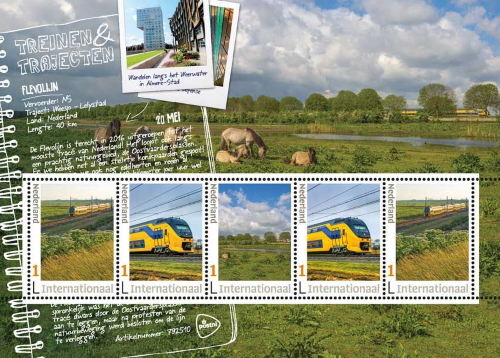

|
2021 (5): Sheet of personalised stamps with Steam tram.
Graphic artist Anton Pieck was born on 19 April 1895 in Den Helder in the Netherlands and died in 1987.
From 1952 to 1974, Pieck was responsible for designing almost everything for fairy tale park Efteling in Kaatsheuvel, now one of the major theme parks in Europe.
This sheet shows the steam tram, a vehicle that belonged the the era he most loved and made paintings and drawings about.
NVPH: V3642P-800068.
|
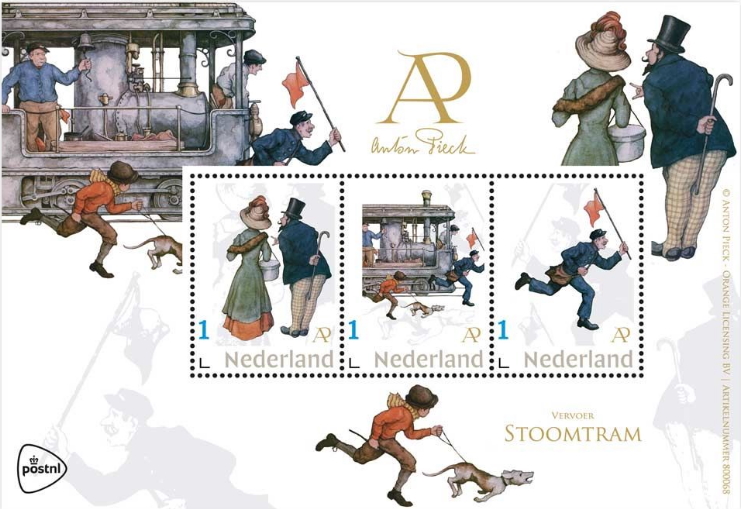

|
2021 (6): Two sheet of personalised stamps with De Veluwsche Stoomtrein Maatschappij (VSM).
The Veluwsche Stoomtrein Maatschappij (VSM) is a Dutch heritage railway between Apeldoorn and Dieren. It passes through the following villages: Lieren / Beekbergen, Loenen, Eerbeek.
Rides on their steam trains are popular with tourists visiting the region, and that is why VSM operates mainly during the summer vacation. VSM, founded in 1975, is operated by volunteers.
In March 2011 one of the individuals who possessed a number of locomotives decided to sell his collection. This could have meant that VSM would lose some of the biggest and most popular locomotives in their collection. VSM decided to buy the whole collection in order to keep for future generations.
Each year, on the first weekend of September, the "Back to Then" (Dutch: Terug naar Toen) event is held, using everything that will run. Usually a number of guest locomotives appear as well.
The last run on Saturday used to be the highlight of the event until 2007, originating in Apeldoorn. The train was pushed and pulled by all operational steam locomotives. In 2005 and 2006 that was 10 engines and a number of carriages.
As of 2018, VSM has 19 steam locomotives and 23 diesel engines. Also over 20 passenger coaches and several goods wagons. The rolling stock is usually stationed at the VSM's depot at Beekbergen.
Most of the steam engines originate from Germany, from the Deutsche Bundesbahn and the Deutsche Reichsbahn. There are also 2 locomotives from Poland, and one from Austria. VSM displays engines of classes 23, 44, 50, 52.80, 64, 80, 41 and the Polish TKp. Most of these were built in the 1940 or 1950s. The oldest locomotive owned by the VSM is number 80 036 (DRG Class 80) from 1929, and which has been at the VSM since 1976.
The diesel engines are originally from the Dutch state railways, Nederlandse Spoorwegen (NS). This way the VSM has a valuable collection of Dutch diesel engines dating from the fifties and sixties from the last century. Present are locomotors (serie 200/300), shunters (serie 500/600) and main line engines (series 2200/2300 and 2400/2500). Passenger coaches available from the NS are six ‘Blokkendozen’ (Mat '24), eleven ‘Bolkoppen’ (Plan D and Plan K) and two steel guard coaches. Also eight Austrian carriages with two axles and open platforms. Also present are 3 Wagon Lits dining cars and 3 Mitropa cars. Most of these are licensed to run on the Dutch railways. Among the other items there are a coaling crane and an accident crane from the NS.
NVPH: V3642P-01 and V3642P-02.
|
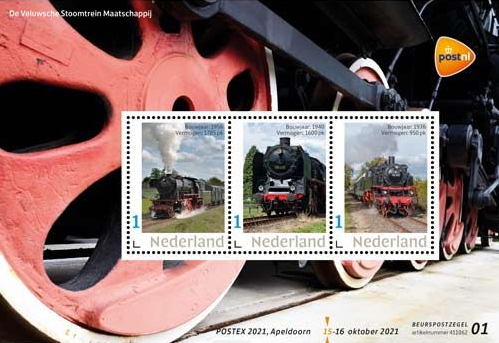
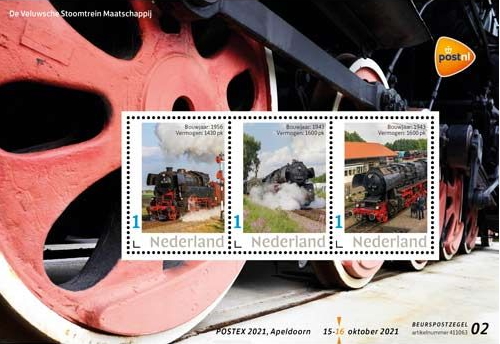

|
10-11-2021 (13): Thalys international, personalised stamp sheet from the series Treinen & trajecten (Trains & Tracks)
Thalys
Thalys is a French-Belgian high-speed train operator originally built around the LGV Nord high-speed line between Paris and Brussels.
This track is shared with Eurostar trains that go from Paris, Brussels or Amsterdam to London via Lille and the Channel Tunnel and with French domestic TGV trains.
Thalys also serves Amsterdam (via the HSL-Zuid) and German cities in the Rhein-Ruhr, including Cologne, Düsseldorf, Duisburg, Essen and Dortmund.
The service is managed by Thalys International, which is 70% owned by SNCF (the national railway company of France) and 30% owned by the National Railway Company of Belgium (NMBS/SNCB)
and operated by THI Factory which is 60% owned by SNCF and 40% owned by NMBS/SNCB.
It is because the Amsterdam-Paris connection that this international train is presented here.
NVPH: 3644-1.
|
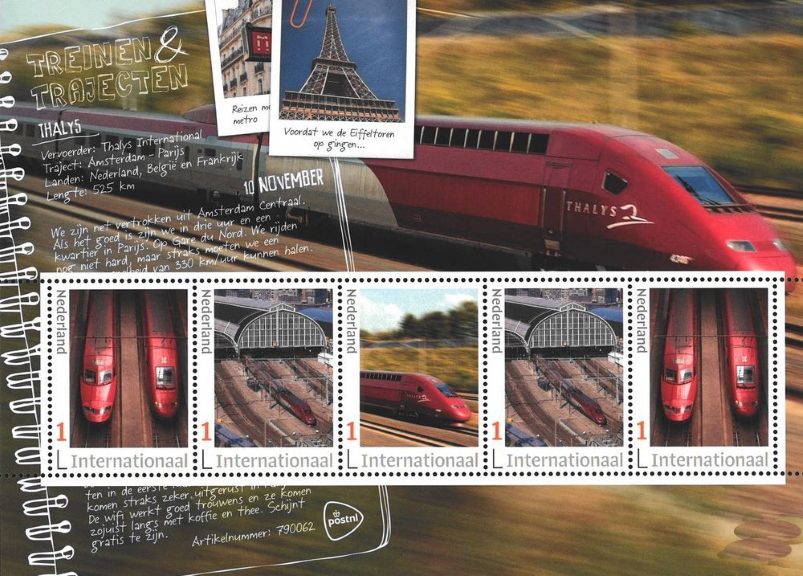

|
16-05-2022: mail trains
A sheet of 5 stamps with Dutch mail trains. Several railway companies had equipment built specifically for the postal service, e.g. the
Motorposten which were owned by PTT and were used for postal transport on the Dutch Railways between 1965 and 1997.
On May 16, 2022, PostNL issued the Postal Trains stamp sheet because 25 years ago on this day the last postal train ran through the Netherlands.
All postal trains on the stamps can be seen this year from 17 May to 27 November at the Postal Train Expedition exhibition in the national railway museum in Utrecht.
With a number of special collection items, the exhibition provides an overview of postal transport by train from the mid-19th century to 1997, the year of the last postal train ride in our country.
NVPH:---.
|
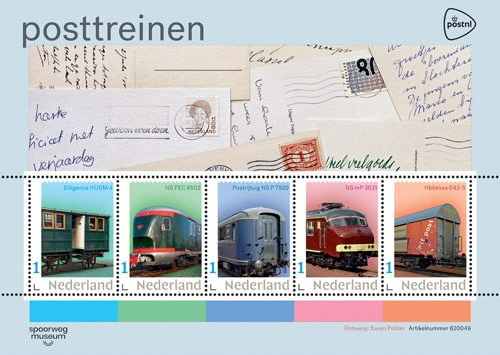

|
2022: Railway Bridge Hanzeboog
This stamp is part of the 2022 Kijk op Nederland sheet for the province of Overijssel.
The Hanzeboog is a railway bridge near Zwolle over the river IJssel and is part of the railway line Utrecht - Kampen and the railway line Lelystad - Zwolle.
The bridge was opened in June 2011.
Due to the construction of the Hanzelijn, a new cross-river connection was needed to replace the old bridge.
After a long discussion, a new bridge was chosen instead of a tunnel.
The new railway bridge is located at Rhine navigation height (Rijnvaart Hoogte), which makes it easier for shipping to pass and no movable section is needed anymore.
The design is by Quist Wintermans Architects.
The new bridge is located a few tens of meters upstream from the old one and consists of a double track and a cycle path.
The railway bridge, which has been given the name Hanzeboog, has a length of 1 kilometer and rests on 18 concrete pillars,
giving the water more space at high water levels.
During the weekend of 1 and 2 May 2010, the main span was hoisted into place.
The bridge was taken into use during the Easter weekend of 2011 in the direction of Amersfoort - Zwolle.
During the following Whitsun weekend, the track for the direction Zwolle - Amersfoort was connected,
with which the new bridge was fully put into use from 14 June 2011.
source: Wikipedia
NVPH:---.
|
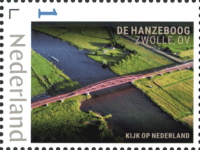
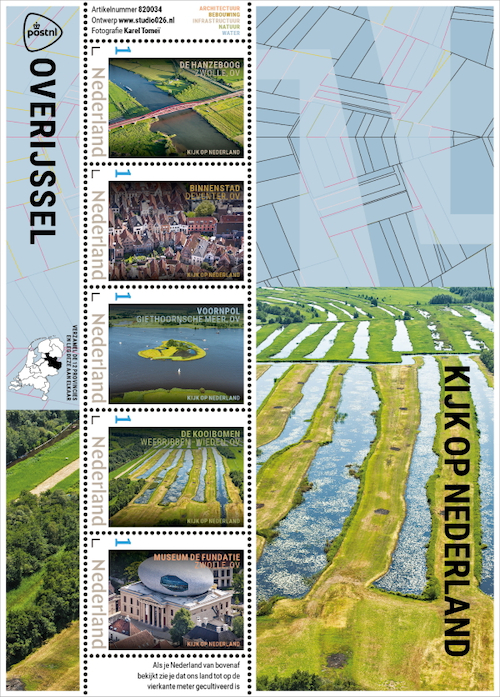

|
2022: Railway Bridge across Schelde-Rijn Canal.
The stamp is part of the 2022 Kijk op Nederland sheet for the province of Zeeland.
The Railway Bridge across the Scheldt-Rhine Canal (also known as the Kreekrak Railway Bridge) south of the Kreekrak locks spans the Scheldt-Rhine Canal
and is part of the Roosendaal - Vlissingen railway line. The bridge has a main span of 140 meters and two side spans (bridges) of 40 meters.
The bridge is located between the A58 and the Oude Rijksweg (N289).
A second Kreekrak railway bridge is located 67 meters to the west and spans the Spuikanaal Bath with 158 meters and a road on both sides of the canal.
source: Wikipedia
NVPH:---.
|
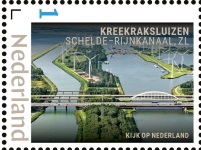
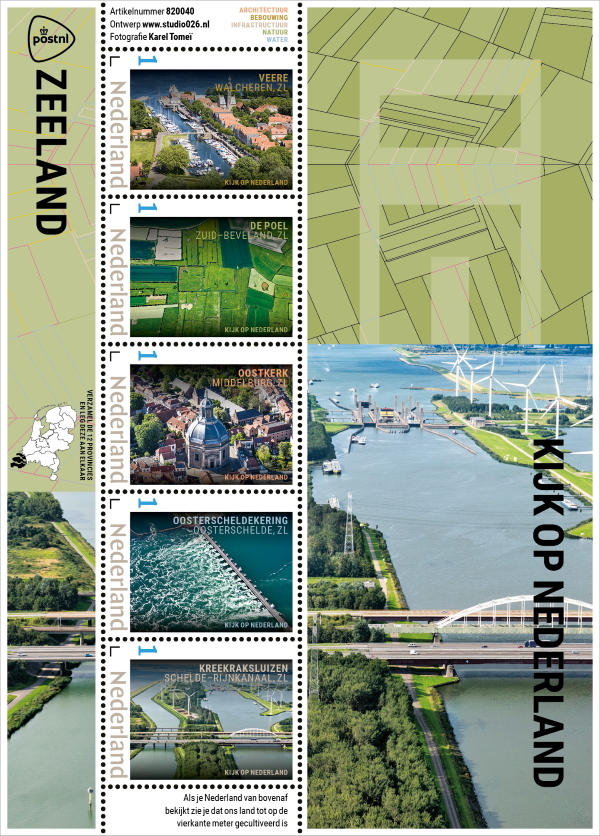

|
2022: The old Houten station building.
The first station in Houten was opened on November 1st, 1868. This was a first-generation water waterstaats stations that were built
in several places along the Utrecht - Boxtel railway line.
The station was built in 1867 to a design by G. van Diesen and is the only remaining example of this type.
The station master had his home and work space in the building. There were also two waiting rooms, a luggage room, warehouse and toilet areas.
The building had an attic and a small cellar. There was equipment on the platform for operating the points and level crossing.
From 1871 it was also possible to send telegrams via the station.
Several employees of the Staatsspoor were present at the station. In addition to the station master, there was a switchman and a telegraph operator.
There was also staff for loading and unloading goods. Four civilian houses were built opposite the station in 1908 for various employees.
The station building was located at a distance from the built-up area, among the orchards. Most of the staff came from the village,
but the station masters from all over the country. The new, modern, station building is in the village centre.
source: Wikipedia
NVPH:---.
|
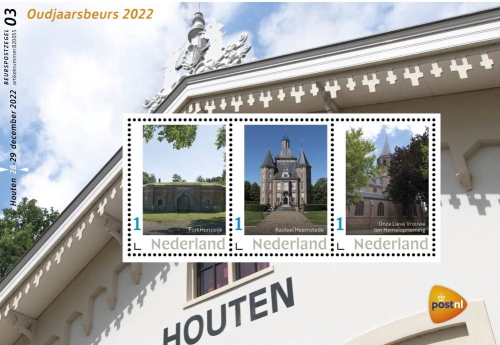
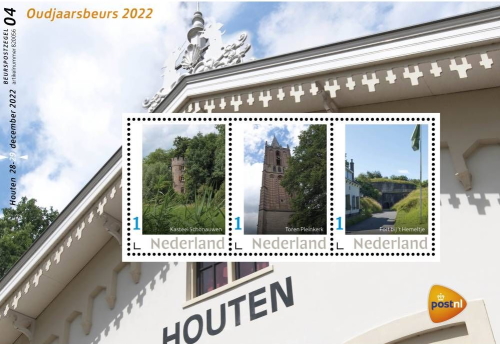

|
17-2-2025: trams of the Arnhem Open Air Museum.
The stamps depict five historic tram types. The GETA 76 of the Municipal Electric Tram Arnhem, pictured in the color photo, is a replica made by the Netherlands Open Air Museum. The original trams in this series were built in 1929 by Beijnes in Haarlem. Before that time, these trams were very modern, with their four axles, one-man operation, and slanted windshields that prevented lamp reflections. The RET 520 of the Rotterdam Electric Tram was built in 1931 by Werkspoor in Utrecht. This four-axle tram weighs 18 tons and has 22 seats and 25 standing places. Until the late 1960s, these vehicles shaped the streetscape of Rotterdam. The GVB 903 of the Amsterdam Municipal Transport Company was built in 1949, also by Werkspoor. This tram was part of the Amsterdam tram network from 1949 to 1975. Because of its red nose, this model quickly earned the nickname "The Bloody Nose." The 1921 HTM 274 of the Hague Tramway Company served in The Hague until 1963. It belonged to the 250-279 series, manufactured by HAWA in Hanover. The tram runs on two Crompton motors (500 volts, 63 kW). The NBM 20 of the Dutch Local Railway Company was built by Allan & Co in Rotterdam in 1910 for the narrow-gauge line from Driebergen to Zeist. In 1923-1924, this motor car was converted to standard gauge for service on the Utrecht-Zeist line.
The GETA 76, RET 520, GVB 903, and HTM 274 can be found at the Netherlands Open Air Museum; the NBM 20 is owned by the Amsterdam Electric Museum Tramway.
Technical details:
Stamp size: 30 x 40 mm (W x H)
Sheet size: 170 x 122 mm (W x H)
Plain paper with phosphor print
Gummed
Printing technique: Offset
Printing colors: Cyan, magenta, yellow, and black
Count of 6,000 sheets
Appearance: Sheet of 10 stamps in 10 different designs
Value designation: 1 for mail up to 20 grams destined for the Netherlands
Designed by: studio026, Velp
NVPH:---.
|
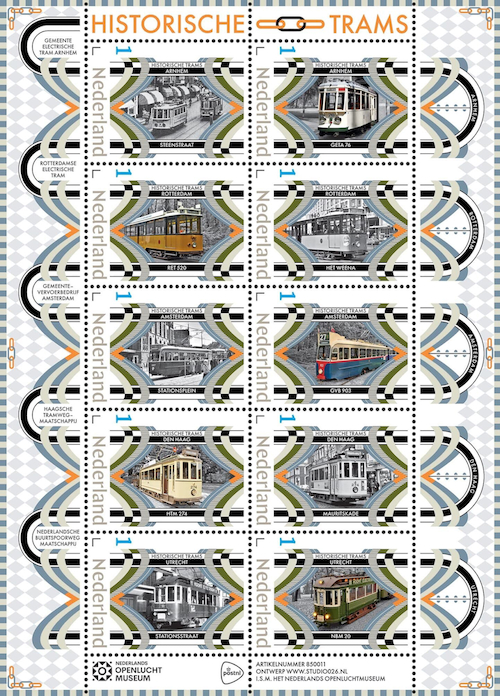
|
19-5-2025: station buildings.
In the Netherlands, there are 399 buildings currently used as railway stations and 243 buildings that once served as such but have since been repurposed. In recent years, artist Sandra Mackus created a black-and-white pen and ink drawing of the exterior of each of these 642 station buildings, in A5 format. The following Dutch stations are depicted on the Dutch station building stamps: Amsterdam Sloterdijk, Wieringerwaard, Tzummarum, Tilburg, Lansingerland-Zoetermeer, Schijndel, Twisk, Heemstede-Aerdenhout, Rotterdam Centraal, and Wittebrug-Pompstation.
Technical details:
Stamp size: 40 x 30 mm (wxh)
Sheet size: 122 x 170 mm (wxh)
Plain paper with phosphor print
Gummed
Printing technique: Offset
Printing colors: cyan, magenta, yellow, and black
Edition: 6,000 sheets
Appearance: Sheet of 10 frame stamps in 10 different designs
Value indication: 1 for mail up to 20 grams destined for the Netherlands
Design: Sandra Smulders, Vormgoed, Gouda
Drawings: Sandra Mackus, Weert
Printing company: Royal Joh. Enschedé B.V., Haarlem
NVPH:---.
|
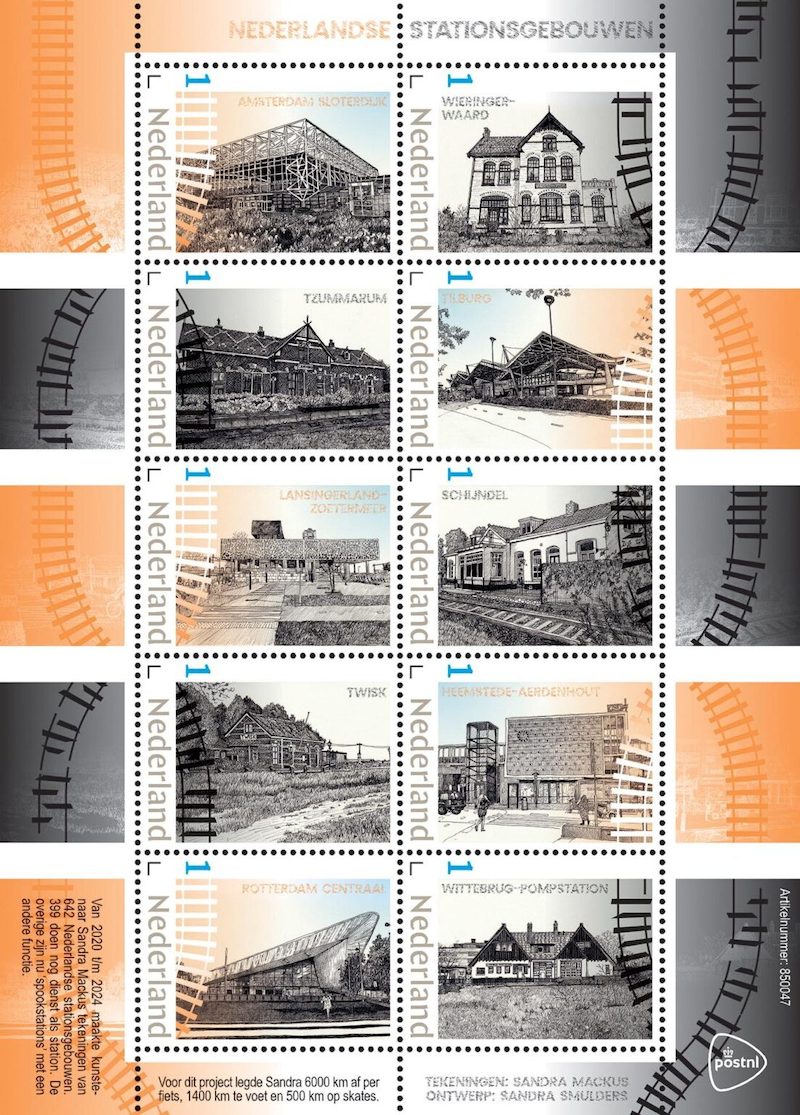
|
Latest update of this page was on 16-10-2025
Bottom of the page

UP






